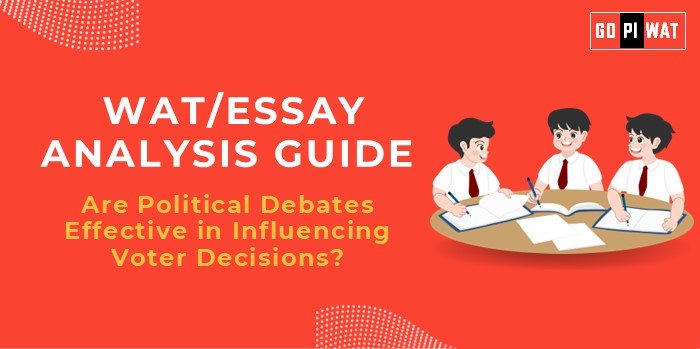🖋️ WAT/Essay Analysis Guide: Are Political Debates Effective in Influencing Voter Decisions?
🌟 Understanding the Topic’s Importance
Political debates are pivotal in shaping the opinions of undecided voters and encouraging civic engagement. They spotlight candidates’ ability to articulate policies, defend viewpoints, and react under pressure—traits that mirror leadership in business and governance. For B-school aspirants, analyzing debates offers insights into strategic communication and decision-making frameworks applicable to high-stakes environments like boardrooms or negotiations.
📝 Effective Planning and Writing
- Time Allocation:
- ⏳ Planning: 5 minutes (jot down points and examples).
- ✍️ Writing: 20 minutes (ensure a logical flow).
- 🔍 Review: 5 minutes (refine and check grammar/structure).
- Essay Structure:
- 📜 Introduction: 70 words.
- 📖 Body: 375 words divided into achievements, challenges, and outlook.
- 📝 Conclusion: 70 words.
🎯 Introduction Techniques
- Contrast Approach:
“While debates enhance transparency in politics, their tendency to prioritize optics over substance raises questions about their true efficacy in guiding voter decisions.”
- Solution-Based Approach:
“Political debates have the potential to shape voter decisions but require evolution in their format to prioritize substance over spectacle.”
🔍 Structuring the Essay Body
- Achievements:
- 📺 The Nixon-Kennedy debate (1960) highlighted the power of televised debates, swaying public opinion significantly.
- 📊 Research shows that debates influence 12-20% of undecided voters, showcasing their potential in shaping election outcomes.
- Challenges:
- ⚖️ Media Bias: Moderation and post-debate analysis can skew public perception, as seen in debates with high emotional rhetoric but low policy discussion.
- 🎭 Theatrics vs. Substance: Performance metrics like body language often overshadow policy content, reducing the debates’ effectiveness in driving informed decisions.
- Future Outlook:
- ✔️ Fact-Checking: Real-time verification can enhance accountability and focus on truth.
- 🌟 Inclusivity: Incorporating voter concerns into debate questions ensures relevance and engagement.
💡 Concluding Effectively
- Balanced Perspective:
“While political debates offer a vital platform for democratic dialogue, their impact on voter decisions depends on balancing performance with substantive discussions.”
- Global Example Approach:
“Adopting globally successful debate formats, such as France’s issue-centric style, can make debates more effective in guiding voter choices.”
📊 Analyzing Successes and Shortcomings
- Key Achievements:
- 🎤 Better informed electorate through exposure to contrasting views.
- 📈 Enhanced democratic engagement, with spikes in voter turnout after key debates.
- Ongoing Challenges:
- 🎭 Overemphasis on style rather than content.
- 📵 Accessibility issues, particularly for audiences with limited media access or understanding.
🚀 Recommendations for Sustainable Progress
- ✔️ Live Fact-Checking: Ensure debates focus on verifiable claims.
- 🤖 AI-Driven Analysis: Provide audiences with immediate insights into candidates’ rhetoric and accuracy.
- ⚖️ Neutral Moderation: Employ independent panels to mitigate bias.
📚 Sample Short Essays
- Balanced Perspective:
“Political debates reflect democracy’s vibrancy, offering a platform for candidates to present their visions. However, to maximize their impact, debates must balance substance with performance and ensure accessibility for all voter demographics.”
- Solution-Oriented:
“Strengthening debate formats by incorporating live fact-checking, citizen-centric questions, and unbiased moderation can significantly enhance their ability to guide voter decisions effectively.”
- Global Comparison:
“Learning from globally successful debate structures, such as France’s focused approach and the U.S.’s engaging formats, can help debates better serve voters and strengthen democratic processes.”


